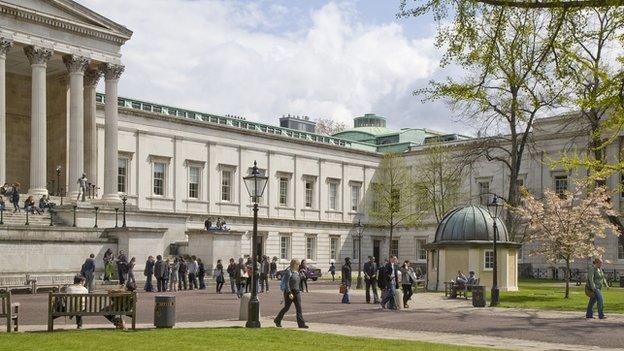London overtaking Oxbridge domination
- Published

University College London has overtaken Cambridge in research quality rankings
London universities are breaking up the traditional dominance of Oxford and Cambridge, according to official figures on research excellence.
The London School of Economics has the highest proportion of "world-leading" research among UK universities.
In rankings based on research grades, University College London has overtaken Cambridge for the first time.
The research ratings will determine the allocation of £2bn public funding for universities each year.
The findings are based on a massive funding-council project evaluating the quality of research at universities across the UK, with the last similar exercise having been published in 2008.
The Research Excellence Framework measured the quality of research from more than 52,000 academics in 154 universities.
It revealed the rise of London institutions, catching up and overtaking Oxford and Cambridge and the decline of big universities in the north of England.
'Taking a hammering'
William Cullerne Bown, of Research Fortnight, which analyses research and funding, said "London looks unstoppable" and universities in the capital "could now eclipse Oxbridge".
He said this process would be further accelerated by major plans for expansion at University College London (UCL) and Imperial College.
"The biggest losers are Manchester, Liverpool, Sheffield, Birmingham and Leeds. The North is taking a hammering," he added.
"The government is indeed rebalancing the economy - but towards London instead of away from it.
"Outside the elite in the South East, almost all the other leading universities in England now face relentless decline."
The growing concentration of higher education resources and excellence in London follows a wider trend in education, which has seen schools in the capital outstripping the rest of England.
International rankings have also shown UCL and Imperial matching or overtaking the traditional Oxbridge duopoly.
The figures from the higher education funding councils for England, Scotland, Wales and Northern Ireland show that 30% of the research submitted was "world leading" and 46% was "internationally excellent".
'Global city'
Nick Hillman, director of the Higher Education Policy Institute, said that unless there was an increase in overall budgets, funding would increasingly be concentrated in fewer places, such as the so-called "golden triangle" of London, Oxford and Cambridge.
He warned that this "could have some dramatic regional effects" for other universities.
UCL's provost, Michael Arthur, said: "There is clearly a London factor at work in today's outcome.
"This is a global city, which makes attracting world class researchers that bit easier for our universities.
"Our popularity with students worldwide has also helped to drive funding and expansion."
There are no official rankings produced by the funding councils, but Research Fortnight has produced its own league table showing how the "market share" of research funding could be distributed - weighted to take into account that bigger research teams are likely to get more.
This puts the University of Oxford in top place, but University College London has now taken second place ahead of Cambridge.
The vice-chancellor of Oxford, Andrew Hamilton, welcomed the recognition for research across a "huge range of subjects and of the real impact they have on health, prosperity, policy formation and culture around the world".

Flying ahead: Imperial College is one of the most highly rated research universities
Imperial College in London is also able to claim to have the best results from the evaluation, with the highest combined level of "world leading" and "internationally excellent" research - with 91% of its submitted work falling into one of these top categories.
There are also ratings by individual subject areas. These are based on the work submitted for evaluation - so some universities are assessed on hundreds of academics while others are measured on the work of a handful.
Madeleine Atkins, chief executive of the Higher Education Funding Council for England, said the exercise showed that "UK universities are in the top rank of an internationally-competitive research community".
Universities Minister Greg Clark said: "Britain's outstanding reputation in research is founded on excellence.
"A rigorous and unflinching review by fellow experts assures that excellence, this is why the REF is such a crucial driver of quality."
- Published16 September 2014

- Published29 October 2014

- Published1 July 2014